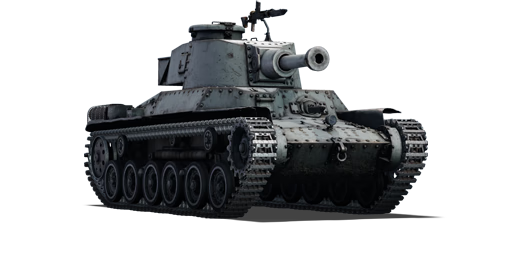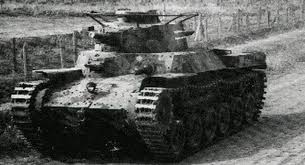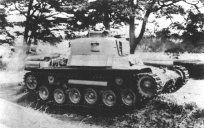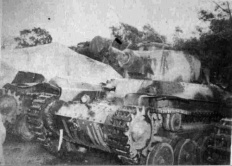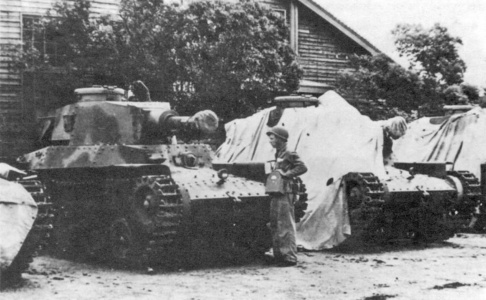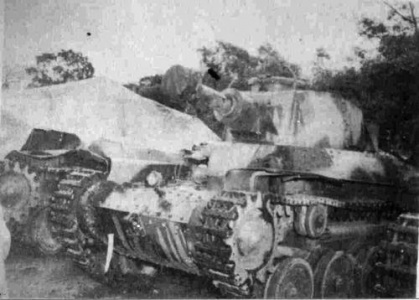Chi-Ha Short Gun
Contents
| This page is about the premium Japanese medium tank Chi-Ha Short Gun. For other uses, see Chi-Ha (Family). |
Description
The Type 97 Chi-Ha Short Gun is a premium rank Japanese medium tank with a battle rating of (AB), (RB), and (SB). It was introduced in Update 1.65 "Way of the Samurai" with the initial Japanese tank tree.
The Chi-Ha Short Gun is a Naval refit of the Chi-Ha Kai with a Navy short gun (120 mm), it keeps the decent mobility from the Chi-Ha chassis but loses the turret rotation speed due the added weight of the gun.
General info
The Type 97 Chi-Ha is an upgraded version of the earlier Type 89 I-Go Ko. The engine has been upgraded, from the Mitsubishi A6120VD air-cooled straight-six diesel with 120 hp to a Mitsubishi SA12200VD air-cooled V12 diesel with 170 hp. As such, the top speed has increased from 27 km/h on the I-Go Ko to 40 km/h on the Chi-Ha.
The Chi-Ha Short Gun is a later iteration of the Chi-Ha with a modified turret coming from the Chi-Ha Kai. For firepower the Chi-Ha Short Gun has a Navy short gun (120 mm) that launches 13 kg HE shells.
Survivability and armour
Light, but effective against weaker guns (i.e. early French), weaker shells (low-calibre HE), and in long range engagements.
Armour type:
- Rolled homogeneous armour
| Armour | Front | Sides | Rear | Roof |
|---|---|---|---|---|
| Hull | 25 mm (11-31°) Front plate
15-17 mm (62-80°) Front glacis 15 mm (37-59°) Lower glacis |
25 mm (25 / 40°) Top
25 mm Bottom |
15 mm (69°) Top
20 mm (5-57°) |
12 mm |
| Turret | 25 mm (9-10°) Turret front
32-35 mm Gun mantlet |
25 mm (9-10°) | 25 mm | 10 mm |
| Armour | Sides | Roof | ||
| Cupola | 25 mm | 10 mm |
- Suspension wheels and tracks are 15 mm thick.
Mobility
| Game Mode | Max Speed (km/h) | Weight (tons) | Engine power (horsepower) | Power-to-weight ratio (hp/ton) | |||
|---|---|---|---|---|---|---|---|
| Forward | Reverse | Stock | Upgraded | Stock | Upgraded | ||
| Arcade | Expression error: Unexpected * operator. | 263 | Expression error: Unexpected round operator. | __.__ | |||
| Realistic | 150 | Expression error: Unexpected round operator. | __.__ | ||||
Armaments
Main armament
| 120 mm Navy short gun | Turret rotation speed (°/s) | Reloading rate (seconds) | |||||||||||
|---|---|---|---|---|---|---|---|---|---|---|---|---|---|
| Mode | Capacity | Vertical | Horizontal | Stabilizer | Stock | Upgraded | Full | Expert | Aced | Stock | Full | Expert | Aced |
| Arcade | 23 | -8°/+15° | ±180° | N/A | 5.7 | 7.9 | 9.6 | 10.6 | 11.3 | 13.0 | 11.5 | 10.6 | 10.0 |
| Realistic | 3.6 | 4.2 | 5.1 | 5.6 | 6.0 | ||||||||
Ammunition
| Penetration statistics | |||||||
|---|---|---|---|---|---|---|---|
| Ammunition | Type of warhead |
Penetration @ 0° Angle of Attack (mm) | |||||
| 10 m | 100 m | 500 m | 1,000 m | 1,500 m | 2,000 m | ||
| Short Ordinary HE | HE | 30 | 30 | 30 | 30 | 30 | 30 |
| Shell details | ||||||||||
|---|---|---|---|---|---|---|---|---|---|---|
| Ammunition | Type of warhead |
Velocity (m/s) |
Projectile Mass (kg) |
Fuse delay (m) |
Fuse sensitivity (mm) |
Explosive Mass (TNT equivalent) (g) |
Normalisation at 30° from horizontal |
Ricochet | ||
| 0% | 50% | 100% | ||||||||
| Short Ordinary HE | HE | 290 | 13.0 | 0.1 | 0.1 | 2,520 | +0.0° | 79° | 80° | 81° |
Ammo racks

| Full ammo |
1st rack empty |
2nd rack empty |
Visual discrepancy |
|---|---|---|---|
| 23 | 18 (+5) | 0 (+23) | No |
Optics
| Chi-Ha Short Gun Optics | ||
|---|---|---|
| Default magnification | Maximum magnification | |
| Main Gun optics | X1.8 | X3.5 |
| Comparable optics | ___ | |
Machine guns
| 7.7 mm Type 97 | ||||
|---|---|---|---|---|
| Mount | Capacity (Belt capacity) |
Rate of fire (shots/minute) |
Vertical guidance |
Horizontal guidance |
| Hull | 3,000 (20) | 498 | ±10° | ±15° |
Usage in battles
Describe the tactics of playing in the vehicle, the features of using vehicles in the team and advice on tactics. Refrain from creating a "guide" - do not impose a single point of view but instead give the reader food for thought. Describe the most dangerous enemies and give recommendations on fighting them. If necessary, note the specifics of the game in different modes (AB, RB, SB).
Modules
| Tier | Mobility | Protection | Firepower | |
|---|---|---|---|---|
| I | Tracks | Parts | Horizontal Drive | |
| II | Suspension | Brake System | FPE | Adjustment of Fire |
| III | Filters | Crew Replenishment | Elevation Mechanism | |
| IV | Transmission | Engine | Artillery Support | |
Pros and cons
Pros:
- Familiar Chi-Ha chassis
- Typically, if the round penetrates, it kills
- Ten-second reload (Expert Crew) with a 120 mm cannon
- Five crew members
- 30 mm of penetration at any range and angle
Cons:
- Only fires high explosive rounds
- Poor turret traverse, just 5.1°/s
- Large shell drop (shells only travel 290 m/s)
- No roof-mounted anti-aircraft/infantry machine gun
History
Development (Chi-Ha)
The Imperial Japanese Army's main tank was the Type 89, adopted in 1929, but it was deemed obsolete as of 1935 and the IJA wanted something up to par with their battle style. The Type 89's main fault was its low overall road speed, which was unable to keep up with motorized infantry. Thus, the development of a new medium tank commenced with the goal of improved overall speed, low weight, and low cost.[1]
Two tank designs were developed with these specifications, both were produced by Mitsubishi. The first was the Chi-Ha which was powered by a 170 hp diesel engine. The second was Chi-Ni, which was lighter, cheaper, and powered by a 135 hp diesel engine. The IJA was to choose in 1937, when the Second Sino-Japanese War broke out. This war increased the IJA's budget and thus they decided to pick the better of the two designs. This led to the finalization of the Type 97 Chi-Ha medium tank. Production started in 1938 all the way to 1942 for a total of 1,162 tanks produced.[1][2]
Development (Chi-Ha Kai)
Japanese Army observers had watched tank developments in Europe and studied as avidly as any European military the operational experiences gained by German, Soviet, and Italian tanks in the Spanish Civil War (1936-1939). In order to improve the anti-tank capability of the Type 97 Chi-Ha medium tank, a new enlarged three-man turret armed with a high-velocity 47 mm gun was combined with the Chi-Ha's hull; hence the new name Type 97-Kai ("improved") or ShinHoTo Chi-Ha ("new turret")[1]. In 1942, it replaced the original model Type 97 in production. In addition "about 300" of the Type 97 tanks with the older model turret and 57 mm main gun were converted.
Development (Chi-Ha Short Gun)
The Short Barrel 120 mm Gun Tank was one variant produced late in the war for the Imperial Japanese Navy. They wanted a gun tank similar to the Type 2 Ho-I for close support, but with greater firepower. The standard 47 mm main tank gun was replaced with a short barrel naval 12 cm (120 mm) "anti-submarine" gun with a muzzle brake added. In addition, it had a small storage compartment added onto the back of the ShinHoTo Chi-Ha turret. Only "about a dozen" were produced for deployment by the Japanese Special Naval Landing Forces.
Media
There are only 3 known images of Chi-Ha 120 mm's, all being American and taken at the naval yard in Sasebo, Japan, October 1945.
- Chi-Ha-120-2.jpg
War Trophy
See also
- Related development
- Type 97 Chi-Ha (base hull)
- Type 97 Chi-Ha Kai (base turret)
- Type 2 Ho-I (reference role)
- Tanks of comparable role, configuration and era
References
External links
| Japan medium tanks | |
|---|---|
| Type 97 | Chi-Ha · Chi-Ha Kai · Chi-Ha Kai TD · Chi-Ha Short Gun |
| Type 1 | Chi-He · Chi-He (5th Regiment) · Ho-I |
| Type 3 | Chi-Nu · Chi-Nu II |
| Type 4 | Chi-To · Chi-To Late |
| Type 5 | Chi-Ri II |
| Type 61 MBT | ST-A1* · ST-A2* · ST-A3* · Type 61 |
| Type 74 MBT | ST-B2* · Type 74 (C) · Type 74 (E) · Type 74 (F) · Type 74 (G) |
| Type 90 MBT | Type 90 · Type 90 (B) · Type 90 (B) "Fuji" |
| Type 10 MBT | TKX (P)* · TKX* · Type 10 |
| Other | Ka-Chi |
| USA | ▅M4A3 (76) W · ▅M47 |
| *Prototype | |
| Japan premium ground vehicles | |
|---|---|
| Light tanks | Ha-Go Commander · Type 16 (FPS) |
| Medium tanks | Chi-Ha Short Gun · Chi-He (5th Regiment) · Ka-Chi · Chi-Nu II · Type 74 (G) · Type 90 (B) "Fuji" |
| Heavy tanks | Ro-Go · ▅Heavy Tank No.6 |
| Tank destroyers | Ho-Ri Prototype · Type 75 MLRS |


